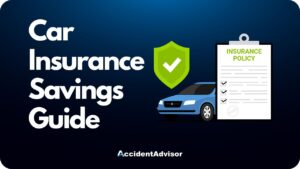The odds of dying in a car crash now rank 9th overall for all preventable causes of death, according to data collected by the National Safety Council (NSC). While taking precautions can certainly help you drive more safely, the fact remains that driving in a car continues to become more dangerous.
In this guide, I want to give you the essential facts on vehicle-related preventable deaths, including statistics on your odds of dying in a car crash using data on demographics and historical trends. I also hope to help you find the right legal options if you lost a loved one in a fatal car crash.
Use this guide to get started, but I always recommend consulting an experienced car accident attorney near you to learn more about your options in your unique situation.
Odds of Dying
According to the NSC, the odds of dying in a car crash have risen to 1 in 93, which is around the same as the odds of being fatally shot. In comparison, consider that the same figures calculate the odds of dying from a fall as 1 in 98 and the odds of dying in a fire as 1 in 1,287.
In our society, we worry more about the rarer causes of death than the most common. For instance, so few people die from being struck by lightning or flying on an airplane that the NSC can’t even calculate those odds. Meanwhile, being a driver or passenger in a car carries a significant risk.
I believe that only by understanding the dangers and the factors that drive these statistics can we prepare for the reality of preventable deaths in this country, which have risen 159% over the last 3 decades.
Preventable Deaths
Your actions leading up to the accident can profoundly change your odds of dying in a car crash. Studies show that failing to buckle up can increase the risk of fatal injury by 50%. Drinking, even if it’s only one drink, can similarly increase this risk, as can driving under the influence of drugs.
I’ve seen many cases where drivers believe that their doctor’s prescriptions do not qualify as “drugs” when calculating the risk of driving. However, many prescription medications have both intended effects and side effects that can lead to an increase in your odds of dying in a car crash, including:
- Drowsiness
- Nausea
- Light-headedness
- Sleepiness
- Shakiness
- Impaired vision
- Impaired concentration
- Low blood pressure/sugar
Before driving, always consider the possible side effects and interactions when taking medication. Drug-related motor vehicle accidents are not always caused by illegal drug users. Many fatal accidents in those statistics are caused by legal, normally safe medications with side effects that can impair reaction time and cause a crash.
Societal Costs
Our society pays $498.3 billion on average every year in costs related to motor vehicle crashes. This amounts to around $2,100 for every licensed driver. Additionally, covering motor vehicle damages costs employers $5.35 billion every year, while the government also pays over $1 billion for government-related vehicle accidents.
You may also be wondering what the personal costs are to someone involved in a fatal car accident. Note that while these costs are not exact, the averages generated by NSC studies and census data are the most accurate available to itemize the individual cost of motor vehicle crashes.
According to their studies, the individual cost of a fatal car crash is around $12.47 million on average, factoring in numerous factors such as lost wages, lost quality of life, and other damages. Note that while non-fatal car crashes are significantly less burdensome, even car crashes with “possible injuries” cost individuals $120,000 on average.
Deaths By Demographic
The odds of dying in a car crash vary depending on certain demographics, particularly age and sex. Since the 5 to 9 and 15 to 24 age groups are less susceptible to other causes of preventable death, like heart disease, motor vehicle crashes consistently rank in the top two causes of preventable death for these ages.
The gap between male and female car crash fatalities is very large, with 33,757 reported for men and only 13,223 reported for women in 2021. Since the number of men and women drivers is about the same, this means that men are nearly three times as likely to die in a car accident as women.
The disparity between races and ethnicities is also significant, with the American Journal of Preventive Medicineshowing that non-Hispanic whites are 73% less likely to die in a passenger car crash than non-Hispanic blacks.
Are the Chances of Dying in a Car Crash Getting Lower?
When comparing data from the last 20 years, your odds of dying in a car crash do not seem to be getting lower. The motor vehicle deaths reported in 2021 (46,980) across all age groups are higher than in any reporting year since 1999.
The average number of licensed U.S. drivers increases around 0.81%-1.14% every year, partially mitigating these odds. But in my opinion, this is not enough to lessen the fact that driving becomes riskier every year.
Legal Options After a Fatal Car Accident
If you lost someone you love in a fatal car accident, you should contact an experienced accident attorney in your area to learn more about your options. These options include an insurance compensation claim for the damage, but in my experience, this is rarely enough to recoup the profound physical and emotional damage to you and your family.
Other options include suing the other driver, depending on the circumstances of the accident, the determination of negligence, and the fault statutes in your state. Additionally, you could sue a company in some cases, such as the owner of the other vehicle in the case of a company-operated vehicle or the manufacturer in the case of an equipment failure.
Conclusion
The odds of dying in a car crash are some of the highest of any preventable injury. They continue to increase, perhaps due to the increasing power and speed of cars, the decreasing quality of driver education, or the prevalence of drug and alcohol abuse. No one can pinpoint a single figure to explain why it’s less safe to get in a car.
But one thing I do know for sure is that no car crash is easy. If you lost someone you love in a fatal car crash, or you were involved in a crash where someone died, you should always contact an accident attorney experienced in similar cases. They can review the evidence and help you deal with such a life-changing event without losing any more than you already have.

Rocky Horton
Author
Rocky Horton is a health and safety expert from Chapel Hill, NC. He is the founder of AccidentAdvisor and has been featured in Forbes, Bloomberg, and other publications. Learn more.













